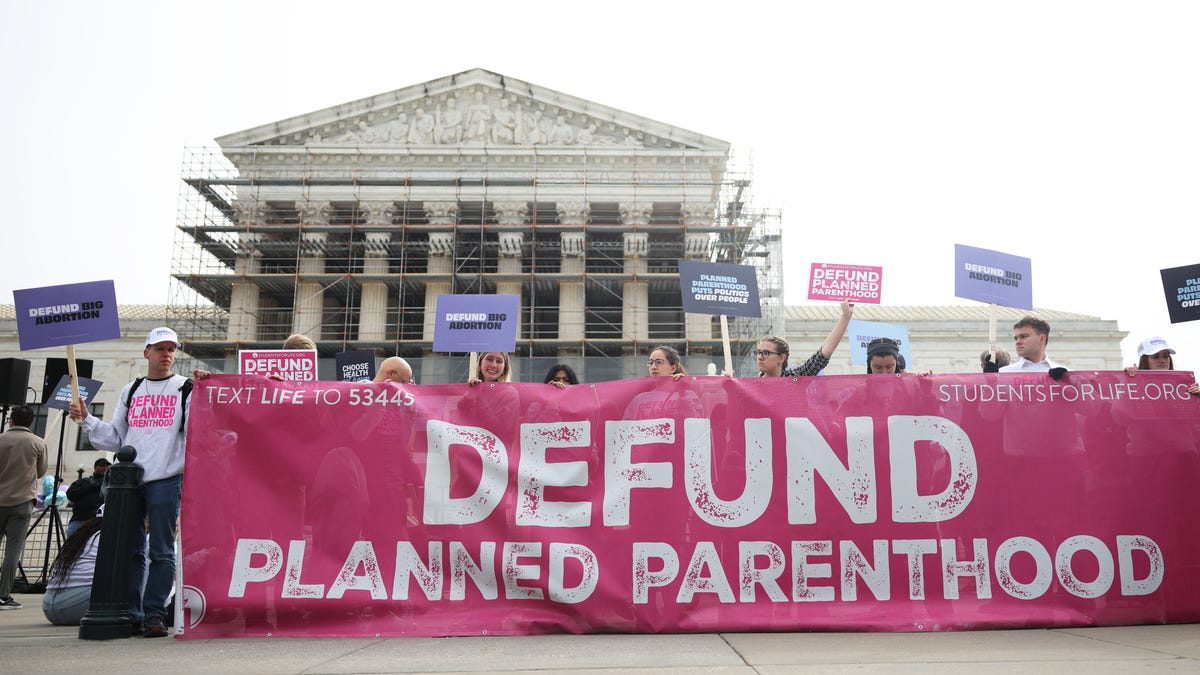The challenger says she’s had trouble finding doctors who will see Medicaid recipients. She said she’s willing to drive more than an hour to go to Planned Parenthood for contraception without judgment
Sen. Cory Booker filibuster on Senate floor tackles spending cuts
A Senate floor filibuster from Sen. Cory Booker tackled possible government spending cuts from Medicaid to Social Security.
WASHINGTON – The Supreme Court on Wednesday took up Republican efforts to block Planned Parenthood from participating in Medicaid in a case that could give a boost to a longtime GOP goal: depriving Planned Parenthood from receiving public funds.
The federal Medicaid Act says people who are eligible may receive health care from any provider that is qualified and willing to participate in the government health insurance program for low-income people.
South Carolina says Planned Parenthood – an abortion provider and a reproductive health care clinic – is not qualified to provide physicals, screen for cancer and diabetes, offer pregnancy testing, and provide contraception and other services because it performs abortion. To South Carolina, providing abortions is “a denial of the right to life.”
The Supreme Court is not deciding whether or not Planned Parenthood is qualified. Instead, they’re reviewing whether a Medicaid patient can fight a state’s rejection of a provider.
Driving an hour for treatment ‘without judgment’
In this case, the challenger is Julie Edwards, a 37-year-old woman who said she’s had trouble finding doctors who will see Medicaid recipients. Edwards said she’s willing to drive more than an hour to go to Planned Parenthood for contraception services because she’s treated “without judgment.”
Nicole A. Saharsky, who represented Edwards and Planned Parenthood, said being able to choose your doctor is a fundamental right that Congress clearly intended to protect.
“There’s no doubt about what Congress was trying to do here,” she said. “It enacted the statute because states were artificially limiting the providers in Medicaid and that’s the same thing that the state is doing now.”
For federally funded programs, the Supreme Court has said individuals can sue if the statute that created the program clearly includes an enforceable right. The court has called that a “demanding bar.”
John Bursch, the lawyer representing South Carolina, said the Medicaid provider provision doesn’t clear that bar because it doesn’t include explicit words like “rights.” Instead, the law says a person “may obtain” care from any willing and qualified provider, a phrase he said is “inherently ambiguous.”
Justice Elena Kagan said “may” simply means that patients aren’t forced to seek medical treatment.
“So that’s the way the `may’ functions in the sentence,” she said.
Bursch also argued that the enforcement mechanism Congress intended was not lawsuits from patients but from the Department of Health and Human Services reviewing if states are substantially complying with Medicaid rules. If a state isn’t, the federal government can cut off its funding.
“There’s experimental flexibility in there and the secretary (of Health and Human Services) is the one that makes the call,” he said. “As long as the secretary is happy, they can continue on their path.”
That position was backed up by the Justice Department. After President Donald Trump took office, the Department of Health and Human Services changed its view on the issue and asked the Supreme Court to let it make that case during Wednesday’s oral arguments.
“We believe the view we’re advancing today is the best reading of the statute,” said Kyle Hawkins, a lawyer for the Justice Department.
Justice Sonia Sotomayor asked how it would be an appropriate enforcement mechanism to have the federal government cut off a state’s funding, “depriving thousands of other Medicaid recipients of coverage in a particular state over the fact that an individual has been denied something that the provision says they’re entitled to.”
While the court’s three liberals aggressively pushed back at South Carolina’s and the administration’s position, the six conservative justices were more sympathetic.
Justice Brett Kavanaugh said the Supreme Court has “really tightened up” the standard for suing but said there’s still confusion in the lower courts.
“One of my goals coming out of this will be to provide that clarity,” he said.
Justice Neil Gorsuch asked Bursch about Planned Parenthood’s claim that it can’t use South Carolina’s administrative review process to dispute its disqualification because that process is controlled by the state.
Bursch said Planned Parenthood can appeal the decision from the administrative process in court.
“It is a remedy that is fulsome and allows them to make any argument they want, he said.
A decision in Medina v. Planned Parenthood South Atlantic is expected by the end of June.
